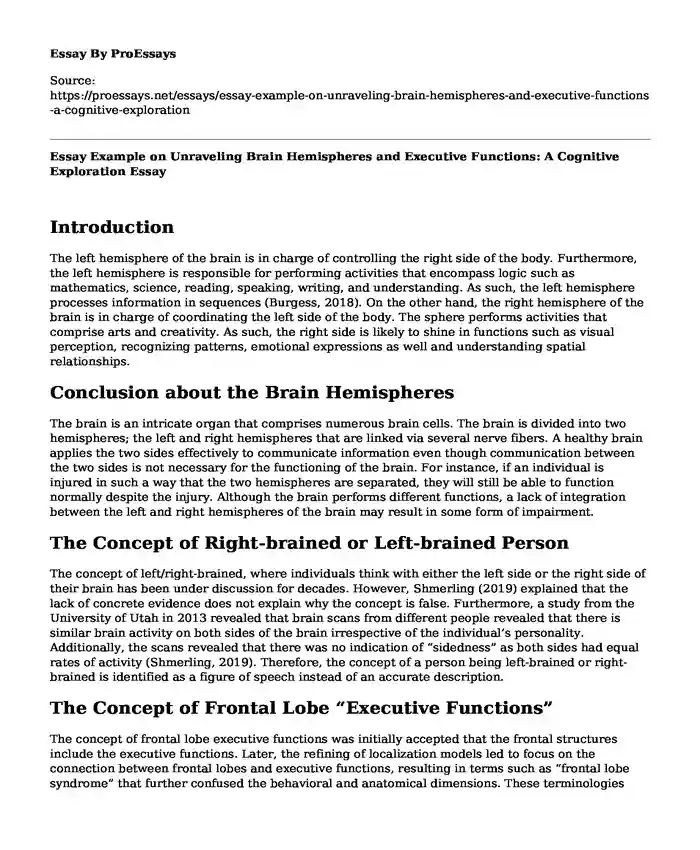Introduction
The left hemisphere of the brain is in charge of controlling the right side of the body. Furthermore, the left hemisphere is responsible for performing activities that encompass logic such as mathematics, science, reading, speaking, writing, and understanding. As such, the left hemisphere processes information in sequences (Burgess, 2018). On the other hand, the right hemisphere of the brain is in charge of coordinating the left side of the body. The sphere performs activities that comprise arts and creativity. As such, the right side is likely to shine in functions such as visual perception, recognizing patterns, emotional expressions as well and understanding spatial relationships.
Conclusion about the Brain Hemispheres
The brain is an intricate organ that comprises numerous brain cells. The brain is divided into two hemispheres; the left and right hemispheres that are linked via several nerve fibers. A healthy brain applies the two sides effectively to communicate information even though communication between the two sides is not necessary for the functioning of the brain. For instance, if an individual is injured in such a way that the two hemispheres are separated, they will still be able to function normally despite the injury. Although the brain performs different functions, a lack of integration between the left and right hemispheres of the brain may result in some form of impairment.
The Concept of Right-brained or Left-brained Person
The concept of left/right-brained, where individuals think with either the left side or the right side of their brain has been under discussion for decades. However, Shmerling (2019) explained that the lack of concrete evidence does not explain why the concept is false. Furthermore, a study from the University of Utah in 2013 revealed that brain scans from different people revealed that there is similar brain activity on both sides of the brain irrespective of the individual’s personality. Additionally, the scans revealed that there was no indication of “sidedness” as both sides had equal rates of activity (Shmerling, 2019). Therefore, the concept of a person being left-brained or right-brained is identified as a figure of speech instead of an accurate description.
The Concept of Frontal Lobe “Executive Functions”
The concept of frontal lobe executive functions was initially accepted that the frontal structures include the executive functions. Later, the refining of localization models led to focus on the connection between frontal lobes and executive functions, resulting in terms such as “frontal lobe syndrome” that further confused the behavioral and anatomical dimensions. These terminologies evoked further debate between those who perceive executive functions as a psychometric construct and those who believe that standardized multidimensional psychological tests can facilitate a direct measure of the activity that happens within the frontal lobes (Otero & Barker, 2017).
Executive Functions
According to Anderson et al., (2009), executive function (EF) can be identified as an umbrella term that is used for diverse hypothesized cognitive tasks that are executed by the prefrontal areas of the frontal lobes. Some of these activities include attention, self-monitoring, memory, initiation, self-regulation, as well as inhibition.
Conclusions from examining the Frontal Lobe
Numerous cognitive processes can be identified as executive functions. However, a majority of these functions are interdependent and may overlap. However, evidence has illustrated that frontal lobes and executive functions are not synonymous despite the frontal lobe playing a significant role in mediating executive function. Nevertheless, pieces of evidence point out that other parts of the brain assist the prefrontal cortex in performing its role in executive function (Anderson et al., 2009).
The importance of the Above Information in understanding human behavior
The executive functions help to promote tasks such as thinking before acting, resisting temptations as well and staying focused. Furthermore, the execution of the different tasks of the executive functions helps to facilitate the developmental progression as well as representative measures of human beings (Diamond, 2013)
References
Anderson, V., Jacobs, R., & Anderson, P. J. (2010). Executive functions and the frontal lobes: A lifespan perspective. Psychology Press.
Burgess, L. (2018, February 26). Left brain vs. right brain: Characteristics, functions, and myths. Health News - Medical News Today. https://www.medicalnewstoday.com/articles/321037
Diamond, A. (2013). Executive Functions. Annu Rev Psychol, 64, 135–168. https://www.ncbi.nlm.nih.gov/pmc/articles/PMC4084861/
Otero, T., & Barker, L. (2013). The Frontal Lobes and Executive Functioning. In Handbook of executive functioning. Springer Science & Business Media.
Shmerling, R. H. (2019, November 8). Right brain/left brain, right? Harvard Health Blog. https://www.health.harvard.edu/blog/right-brainleft-brain-right-2017082512222
Cite this page
Essay Example on Unraveling Brain Hemispheres and Executive Functions: A Cognitive Exploration. (2023, Oct 28). Retrieved from https://proessays.net/essays/essay-example-on-unraveling-brain-hemispheres-and-executive-functions-a-cognitive-exploration
If you are the original author of this essay and no longer wish to have it published on the ProEssays website, please click below to request its removal:
- Expository Essay: The Elderly
- Paper Example on Healthy Aging
- Pharmacotherapy for Respiratory Disorder Essay
- Essay Sample on Growing Moral
- Essay Sample on Adolescents: Mental Health Issues and Self-Harm Risk
- Nursing Profession-5 Core Values, Responsibilities & Impact - Essay Sample
- Midlife Physical Decline: Strategies to Reduce Negative Effects - Essay Sample







